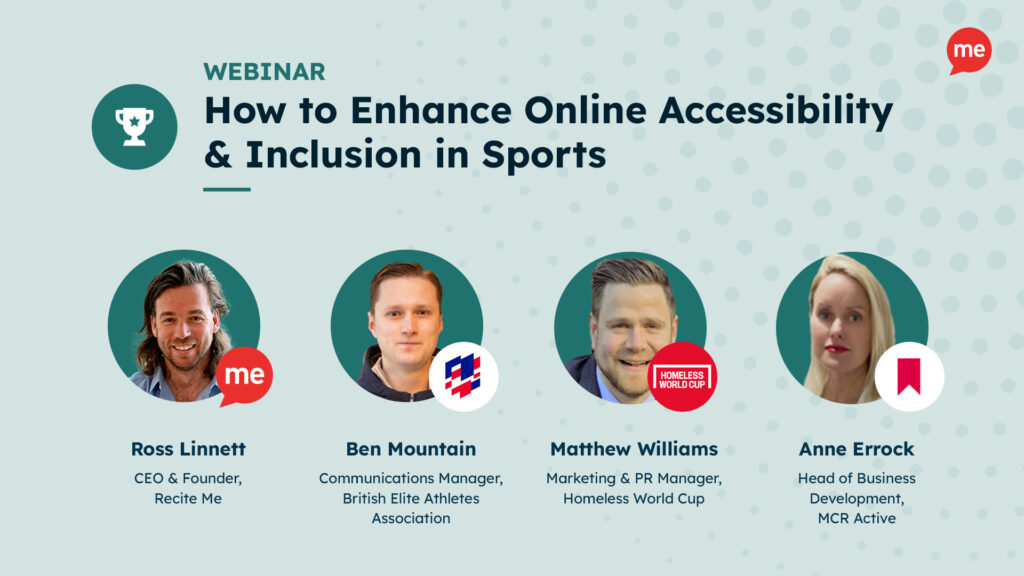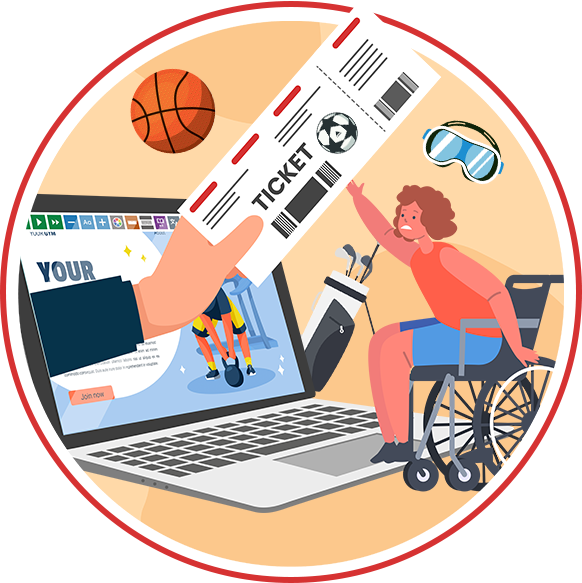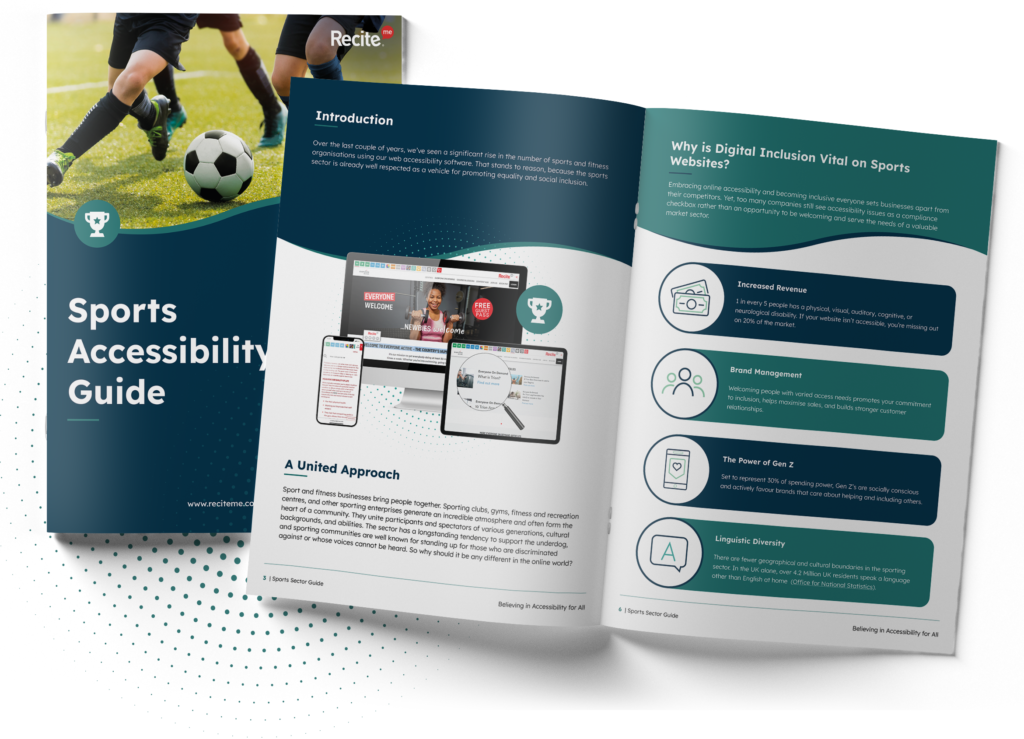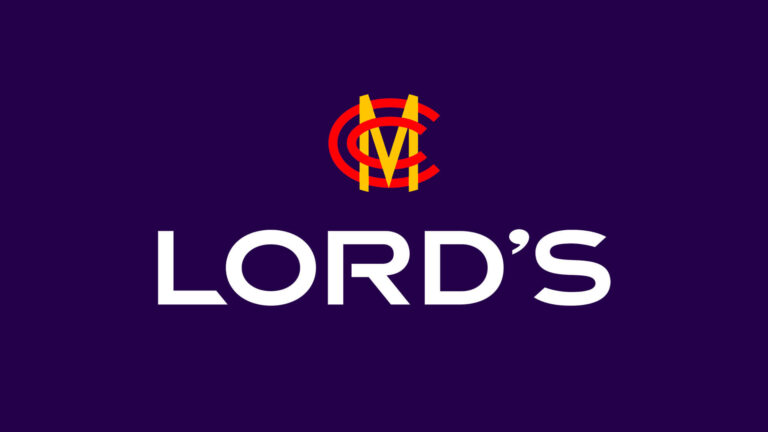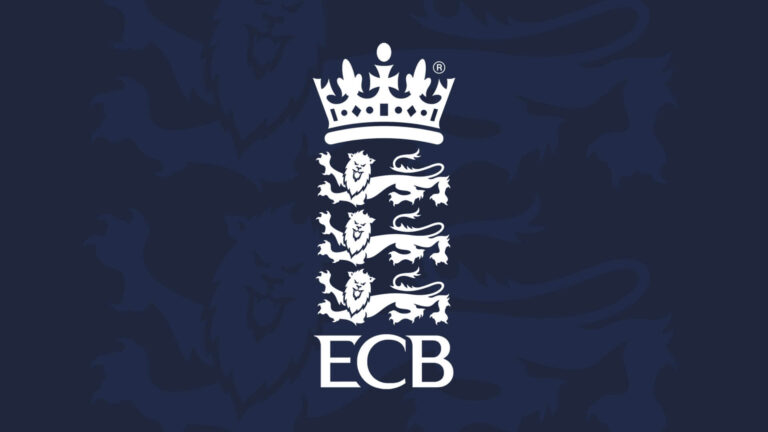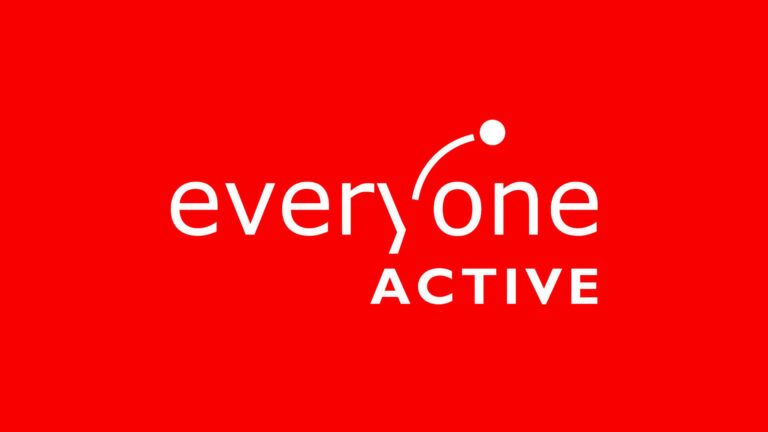Get Your Free Accessibility & Inclusion Toolkit
Download NowIt is estimated that around 16% of the global population have a disability, that’s around 1 in every 6 people. Additionally, the sports market is one of the biggest worldwide, in 2022, the sports industry revenue amounted to just over 486 billion dollars, which is forecasted to rise to 623 billion by 2027. This represents a huge opportunity for growth in the sector, in the coming years. But, it’s critical we bring disabled people along with us worldwide. This article will explore how disability affects people in sport, the challenges they face, what can be done to overcome them and more.
Inspirational Sports People with Disabilities
There are a number of hyper-successful sports people with disabilities. Many of whom have experienced an abundance of success in adaptive sports and the paralympics. Some even compete on the same playing field as able bodied people.
Jim Abbott
Jim was a famous American, Major League Baseball player from 1989 to 1999, despite being born without a right hand. He had a long and successful career, playing for the world-renowned New York Yankees. His most notable achievement came in 1993 when, as a member of the New York Yankees, he pitched a no-hitter against the Cleveland Indians. This historic feat solidified Abbott’s place in baseball history and highlighted his exceptional talent.
Karé Adenegan
Karé is a British Paralympic athlete who was born with Cerebral Palsy, a condition that affects overall mobility, movement and coordination. She made her debut in the 2016 Paralympics, where she won three medals for team GB at the age of 15. An impressive feat for such a young age, but her success carried on beyond that at the World Para Athletic Championships, where she won multiple medals.
Types of Disability-friendly Sports
People with disabilities are not incapable of competing with able bodied people, this can be seen with the case of Jim Abbott above. However, certain disabilities and certain sports do make it significantly more challenging than others. For this reason there is a wide range of disability-friendly sports designed to accommodate individuals with various abilities. These sports focus on inclusivity, adaptive equipment, and modified rules to ensure that everyone, regardless of their physical or cognitive abilities, can participate. Here are some types of disability-friendly sports:
- Wheelchair Basketball: Played with modified rules to accommodate wheelchair users, wheelchair basketball is a fast-paced and highly competitive sport. Athletes with various mobility impairments can participate, and the game emphasises teamwork, strategy, and skill. Wheelchairs can be used in many other similar sports, including tennis and football.
- Para-Athletics: Para-athletics includes a variety of track and field events tailored to different disabilities. These events may include wheelchair racing, seated throws, and ambulant categories for athletes with limb impairments. The most notable para-athletics event is the Paralympics, which is the disabled version of the Olympics.
- Sitting Volleyball: This modified version of volleyball is played while sitting on the floor. It is a popular sport for individuals with lower limb impairments, allowing them to engage in a dynamic and competitive team sport.
- Blind Football (Football 5-a-side): Blind Football is a Paralympic sport designed for athletes with visual impairments. The ball contains bells, and the field dimensions are smaller. Players rely on sound and verbal communication to navigate and score goals.
Download our Sports Accessibility Guide
Read more on why website accessibility is important to sports businesses, who needs support online, the type of access barriers users face, our top tips for an inclusive sporting website.
Challenges that Disabled people face in Sports
There are many challenges that disabled people face in the sporting world. The effects vary depending on the type and severity of the disability, as well as the nature of the sport. However, they can usually be bracketed into a few core areas, which will be discussed below.
Physical Barriers
Arguably the most obvious disability barriers people face in sport are physical barriers. As many disabilities such as Cerebral Palsy limit mobility, other sensory impairments such as low vision or hearing loss can also affect participation in high-level sports. Furthermore, inaccessible facilities and/or equipment that fails to address the needs of these individuals can further amplify the users ability to fully engage in various sporting activities.
Digital Barriers
When we think of sports, people’s minds will typically jump to the physical side of sports. However, much of the planning and pre-event engagement takes place in the online world. Particularly if people are signing up to participate in a sporting event, or purchasing tickets to spectate an event. This is where the need for accessible websites is essential, to ensure that disabled people aren’t met with accessibility barriers that prevent them from completing important actions.
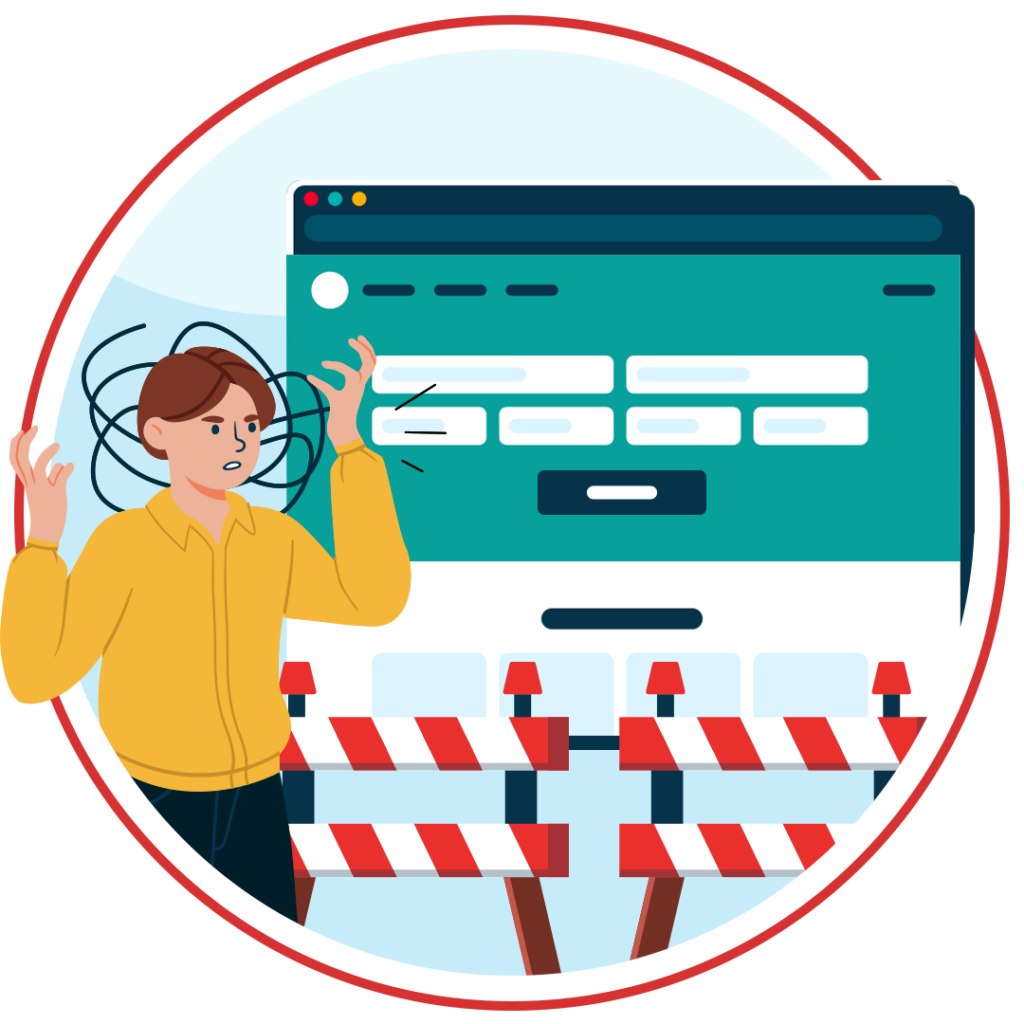
Social Stigma
Negative stereotypes and societal misconceptions surrounding disability contribute to a pervasive social stigma. This can lead to exclusion, lowered self-esteem, and reluctance among disabled individuals to participate in sports due to fear of judgment or discrimination.
Psychological Barriers
Coping with a disability often involves navigating psychological barriers, such as self-doubt and anxiety. Overcoming these mental hurdles is crucial for disabled athletes to build confidence and fully embrace their potential in the sporting realm. In many cases, negative social stigma can amplify these psychological barriers, which is why it is so important to offer support and encouragement to disabled people getting involved in sport.
Financial Constraints
The cost of adaptive equipment, specialised coaching, and medical support can be prohibitively expensive. Financial constraints pose a significant challenge for disabled individuals seeking to participate in sports, limiting their access to necessary resources. Where an able bodied person might just need to pick up a football, or put on some trainers for a run, specialised equipment for disabled people can often cost hundreds (or thousands) of pounds. This is especially challenging for low income households, where the ability to purchase such equipment is not feasible.
What can you do about these challenges?
Addressing the challenges that disabled people face in sports requires a multifaceted approach involving individuals, communities, organisations, and policymakers. However, here are a few examples of actions that can be taken to address these challenges:
- Promote Inclusivity: Encourage sports organisations and communities to embrace inclusivity by creating accessible facilities, programs, and events that cater to individuals with diverse abilities. You can learn more about Inclusion in Sports here.
- Education and Awareness: Increase awareness and understanding of different disabilities within the sports community. This includes educating coaches, athletes, and spectators about the specific needs and capabilities of individuals with disabilities. This can be really beneficial to fight back negative stereotypes and social stigmas placed on disabled people.
- Financial Support: Provide financial assistance and grants to disabled athletes for training, equipment, and participation in sports events. This can help alleviate the financial barriers that often hinder their engagement in sports, helping to create a more equitable playing field. You can learn more about Equity in Sports here.
- Accessible Facilities: Ensure that sports facilities are designed to be accessible to individuals with disabilities. This includes ramps, elevators, accessible changing rooms, and other accommodations to facilitate easy participation. However, don’t just stop at physical facilities, it’s important to make digital products and services accessible too. Whether this be event sign ups, ticket purchasing or online merchandise stores.
- Adaptive Equipment and Technology: Invest in research and development of adaptive sports equipment and assistive technologies to enhance the participation of individuals with disabilities. Making these resources more widely available and affordable for people with disabilities can help to get more people involved in sports.
Our 40-page Digital Accessibility & Inclusion Toolkit helps businesses break down online barriers and make a real impact. It offers practical advice on all aspects of digital accessibility, from writing an accessibility statement to accessible website tips and inclusive hiring.
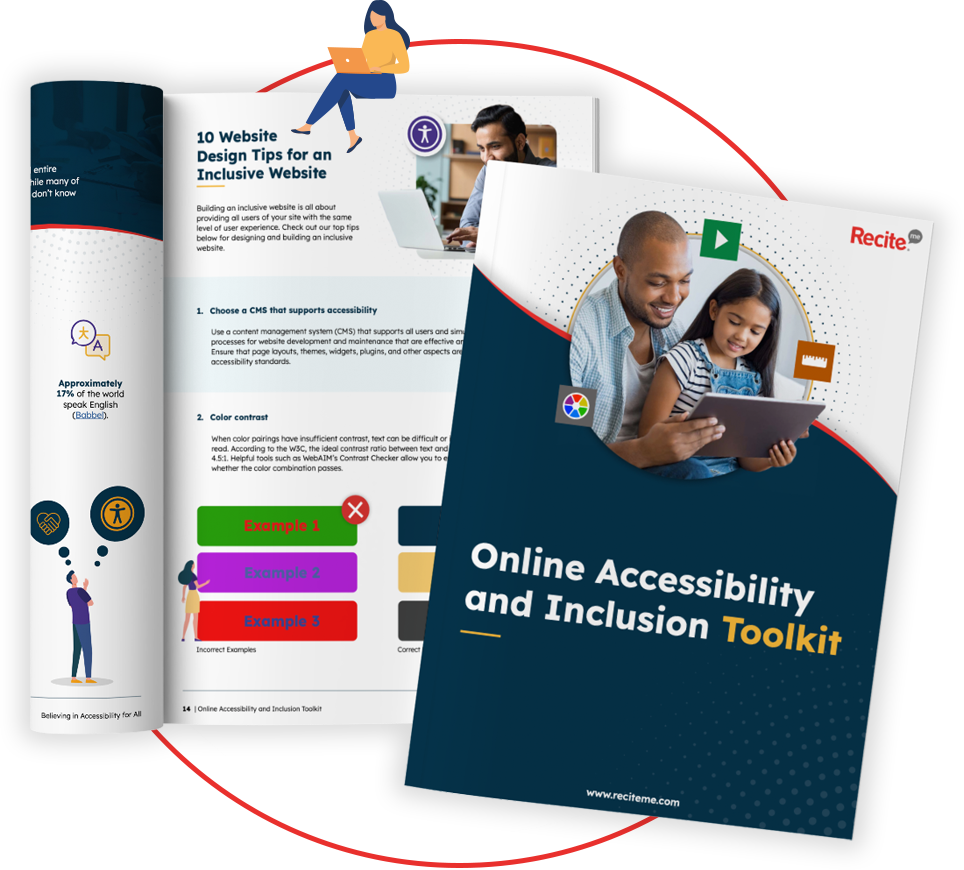
How Can Recite Me help?
At Recite Me we pride ourselves on creating inclusive environments for people online. One of the ways we do this is by supporting sports organisations to create more inclusive experiences for their users. Here is how we can help.
Accessibility Toolbar
The Recite Me Accessibility Toolbar is one of the ways we are helping make sports websites more inclusive. Many of your customers will be signing up to events, purchasing tickets, sporting equipment, merchandise and more from your website. But, if your website isn’t inclusive, then you could be preventing your disabled customers from completing these essential actions. The Recite Me Toolbar offers a number of features to address this, including:
- Personalised font size, type, and colour options.
- Choosing the exact colour contrast between the text and background.
- Utilising the mask screen tool to help with focus.
- Using the ruler tool to make reading easier.
- Download content as an audio file as an alternative to reading.
- Converting page content into over 100 on-screen languages.
- Having the page read aloud in a choice of 65 languages.
- Customising PDF documents or having them read aloud/ translated.
- Zooming in on any part of a webpage.
- Using the built-in spell-checker and a fully integrated dictionary and thesaurus.
Interested to learn more about the tool? Book a free demonstration with a Recite Me accessibility expert.
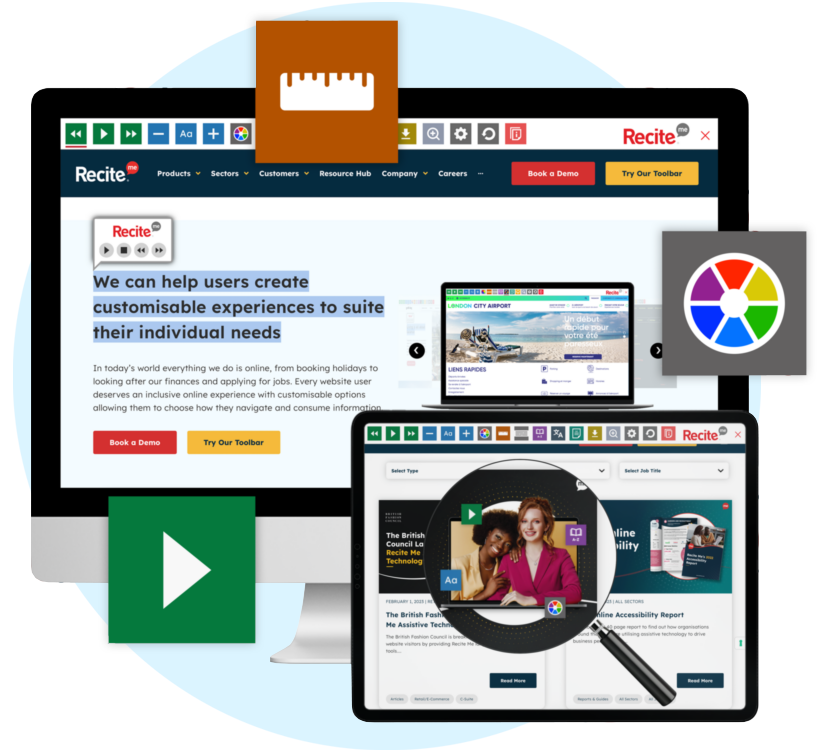
Sports Organisations using Recite Me
Here are a few of our best case studies from the leading sports organisations we’re proud to be partnered with:
On-Demand Webinar: Online Inclusion in Sport
Tune into our on-demand webinar to hear from sporting organisations leading the way in providing inclusive online communications for fans, players and employees.
You will learn how you can engage with disabled, international and elderly visitors via your website. The session will equip you with best practices, hints and tips on how to ensure no one is excluded from your online communications.
